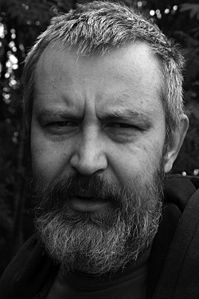- Oleg Pavlov
-
Oleg Pavlov
Photo by Mikhail EvstafievBorn March 16, 1970
MoscowOccupation novelist, short-story writer Nationality Russian Notable award(s) Russian Booker Prize
Influences- Andrey Platonov
Oleg Pavlov (Russian:Павлов, Олег Олегович) (born 1970) is a prominent Russian writer, winner of the Russian Booker Prize.
Born in Moscow, he served in the Interior Ministry troops near the city of Karaganda. The events that Pavlov portrays in his stories and novels were inspired by his own experiences as a prison camp guard.
During his service, Pavlov suffered a head injury, was hospitalised, and spent over a month in a psychiatric ward. This allowed him to be released from the army before the end of the mandatory two-year military service. He went on to study at the Institute of Literature in Moscow.
He was only 24 years old when his first novel, Kazennaya skazka, was published in the Novy Mir Russian monthly magazine. He was noticed by the critics and the Russian Booker Prize jury, which short-listed the novel for the 1995 prize.
His next novel was Matyushin's Case (1997).
Pavlov received the Russian Booker Prize in 2002 [1] for his book "Ninth Day Party in Karaganda: or the Story of the Recent Days" (Karagandinskiye deviatiny).
Pavlov is also the author of articles on literature, historical and social aspects of life in Russia, as well as numerous essays. In his 2003 book "The Russian man in the XX century" he writes about Russian life, not only based on his personal experience, but also on numerous letters received by the Aleksandr Solzhenitsyn Foundation in the early 1990s and given to him by the famous Russian writer and dissident and his wife, Natalia.
Oleg Pavlov is said to be one of the most gifted examples of what has been dubbed the “renaissance in Russian literature.” [2]
Oleg Pavlov’s new novel is called Asystole (colloquially “cardiac flatline”). This novel - about the tragic essence of human life, the loneliness of the individual in the world of people on the importance and power of love. The novel reads like a confession. Its name sounds like a diagnosis. Asystole - cessation of cardiac activity, cardiac arrest. But the capacity to love gives meaning to life, had been languishing. The novel was published in 2009, prompting the reader an emotional shock, becoming, according to critics, one of the major literary events of recent times. The epigraph to him could be the lines of the European philosopher Emile Cioran Michel: "health - lack of feeling, and therefore - unreality. Ceased to suffer, will cease to exist."
External links
- Oleg Pavlov's official site (Russian)
Categories:- People from Moscow
- Russian novelists
- Russian short story writers
- 1970 births
- Living people
Wikimedia Foundation. 2010.

